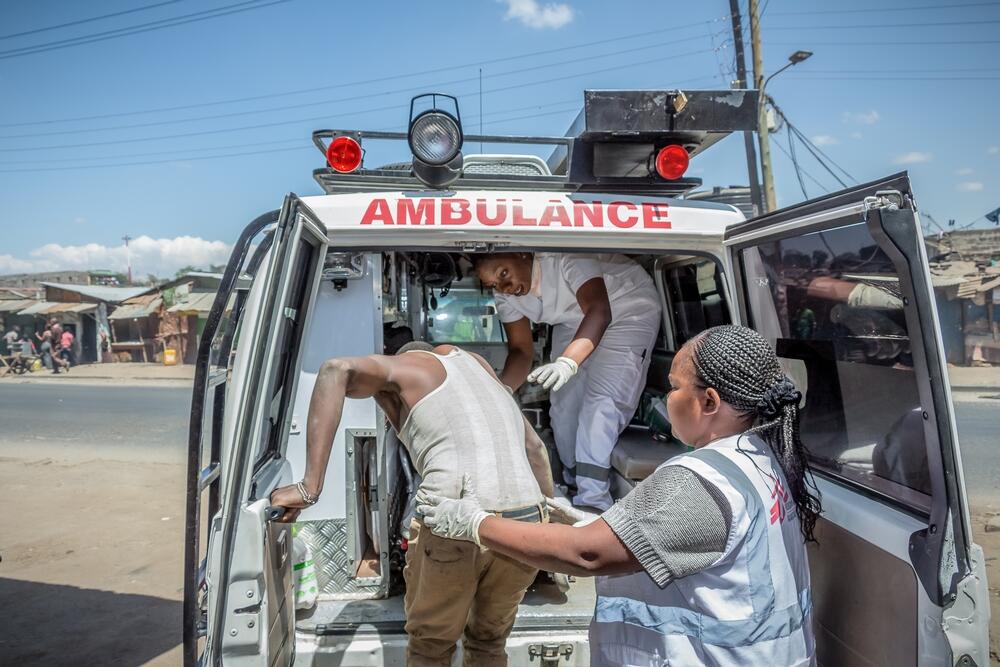Kenya: A night on call in Nairobi
In the Kenyan capital, four ambulances from Médecins Sans Frontières / Doctors Without Borders (MSF) are on standby - ready to respond to emergencies after the sun goes down.
Medical emergencies can happen at any time of day or night. But in the Mathare and Eastleigh districts of the Kenyan capital Nairobi, poor security and few ambulances mean that people here struggle to reach medical care after the sun goes down.
To help fill the gap, staff at MSF’s Lavender House clinic have set up two 24-hour toll-free hotlines with four ambulances on standby for immediate dispatch. This service is proving a lifeline for medical emergencies in eastern Nairobi, especially after dark.
6.45 PM
The night shift officially starts at 7 pm, but the clinic is already busy.
Patient registers need to be filled, ambulances cleaned and restocked and caseloads tallied.
A sense of relief mixes with expectation as watchmen, triage nurses, call centre team leaders, paramedics, ambulance drivers, clinical officers and counsellors huddle in each service area completing their handovers.
The Lavender House clinic is home to a 24-hour emergency room and a specialised sexual violence clinic.
7.28 PM
Team leader Ruth Symekher answers the phone.
A man has just been struck by a speeding motorbike “down near the big roundabout” and is lying on the roadside, unresponsive.
Zulu One heads east with its siren blaring, carving a path through the traffic. A crowd has gathered and several young men chat with ambulance driver, Noah Imbugwa, while the two paramedics administer tramadol and prepare a splint for the man’s broken leg.
“We don’t know what would have happened to him if you hadn’t come,” says one.
When Noah tells them about MSF’s free service, they plug the hotline number into their phones.
The patient is eventually stabilised and ready for transfer to Mama Lucy Kibaki hospital’s emergency room.
As Zulu One leaves “Mama Lucy” just before 8.40 pm, Zulu Two and Three are driving in. It’s been a busy start for everyone.
7.30 PM
A young woman calls the sexual assault hotline. Josphine Wanjoru, the community support assistant, answers the call.
The woman is calling from the police station where she has just reported being raped. The attack involved a man she knew and trusted – a common theme among Lavender House patients.
MSF supports another sexual violence service closer to the woman’s location, so Josphine heads out with driver Joseph Omusi to take her there. She’ll be counselled and medically checked by a trained nurse-counsellor, before being picked up by Josphine again and taken home.
This outreach service is particularly valuable at night for survivors of sexual violence who might otherwise feel too unsafe to seek care.
9.40 PM
Driving through the slum of Mathare, it’s easy to spot “street families”: children of all ages who have banded together to survive. They’re highly vulnerable and are always received at Lavender House with an open door.
The first to arrive tonight is a distressed young boy brought in by two friends, his clothes the same dirty brown from head to toe.
He has been hit on the nose by a flying bottle and he writhes and cries out on the trauma room bed. Although nothing is broken, the team comfort him while he calms down.

Help us prepare for the next emergency
11.25 PM
Just before midnight, staff gather together to eat “lunch”.
Lavender House has just two 12-hour shifts per day, so that staff can safely travel in daylight, whether they’re clocking on or off.
2.55 AM
In the courtyard, counsellor Zaina Ahmed is writing up notes for the two sexual violence cases she has dealt with so far.
3.27 AM
The night’s first obstetric emergency is taking place in a nearby health centre, where a breech baby is causing trouble for her mother.
“By the time Zulu Two got there, both legs and the baby’s bottom were out,” says emergency medical technician Dennis Odour.
“The mother kept pushing and was eventually able to deliver. The baby didn’t make a sound at first but, to everyone’s relief, she was soon crying.”
5.35 AM
A young man staggers in with blood still flowing from a wound inflicted an hour before. He was in a fight at the casino, which ended with a bottle of beer being smashed over his head.
“We see a cocktail of cases,” says trauma nurse Isabella Jumba with a wry smile.
6.20 AM
Sunrise sees a critically-ill elderly woman being carried into the emergency room.
Struggling with pneumonia, she lies limp on the bed as the trauma room staff prepare fluids, plus insulin for her diabetes. Her adult children hover worriedly.
As a “red case” – denoting the most critical patients – she’ll be transferred for higher-level care once she’s been stabilised.
She’s the last patient seen in the night shift and, thankfully, the only red of the evening.
MSF in Kenya
We offer care to refugees and slum dwellers in Kenya and respond to public health challenges such as HIV and access to hospital services.
Our teams first worked in Kenya in 1987.
